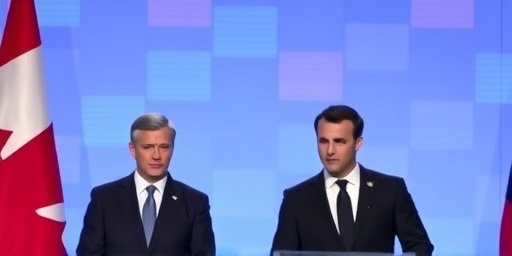In a pivotal moment for international diplomacy, Canadian Prime Minister Mark Carney and French President Emmanuel Macron held high-stakes talks on the sidelines of the G20 summit in Johannesburg, signaling a renewed transatlantic push against rising geopolitical threats and economic uncertainties. As world leaders converge on the vibrant South African city, their discussion underscored Canada‘s growing role in global affairs under Carney’s leadership.
The meeting, which took place just hours before the official G20 opening ceremony, highlighted shared concerns over conflicts in Eastern Europe and the Middle East, while emphasizing collaborative efforts to bolster European defense and stimulate worldwide economic recovery. Carney, who assumed the role of Prime Minister following a surprise electoral victory in 2023, brought his extensive financial expertise from his days as Bank of England governor to the table, advocating for innovative fiscal policies amid global inflation pressures.
“In these turbulent times, Canada and France stand as pillars of stability,” Carney stated during a joint press availability outside the summit venue. Macron echoed this sentiment, adding, “Our partnership is not just bilateral—it’s a blueprint for the G20’s future agenda.” The exchange set an optimistic tone for the three-day gathering, attended by representatives from the world’s 20 largest economies, representing over 85% of global GDP.
Carney’s Vision for Transatlantic Security Takes Center Stage
At the heart of the Carney-Macron dialogue was a commitment to enhancing European defense collaboration, a topic that has gained urgency since Russia’s invasion of Ukraine in 2022. Carney, drawing on Canada‘s NATO obligations, proposed increased joint military exercises and technology sharing between North American and European allies. “Canada is ready to invest more in collective defense,” he affirmed, referencing Ottawa’s recent pledge of an additional CAD 8.1 billion to NATO over the next five years.
Macron, who has long championed European strategic autonomy, welcomed the overtures. France, with its robust defense industry including companies like Dassault Aviation, sees potential in co-developing next-generation fighter jets and cybersecurity protocols with Canadian firms such as Bombardier. Sources close to the talks revealed that the leaders discussed a framework for a “Transatlantic Defense Innovation Fund,” aiming to pool resources for AI-driven defense technologies. This initiative could counterbalance U.S. dominance in the sector while addressing Europe’s fragmented military spending—currently averaging just 1.7% of GDP across EU nations, below the NATO 2% target.
The conversation also touched on the Arctic’s strategic importance, where Canada’s vast northern territories overlap with French interests in Greenland and the overseas territories. With melting ice caps opening new shipping routes, both leaders agreed to prioritize multilateral agreements to prevent militarization of the region. Environmental experts note that such cooperation could mitigate risks from climate change, which has already led to a 20% increase in Arctic shipping traffic since 2015.
This bilateral focus on security isn’t isolated; it’s part of a broader G20 effort to de-escalate tensions. Johannesburg’s summit, hosted by South Africa for the first time since 2010, provides a neutral ground for dialogue, away from the usual Western-centric venues. Carney’s emphasis on inclusive security resonated with African nations present, many of whom view NATO expansions warily.
Navigating Geopolitical Storm Clouds in Johannesburg
Geopolitical issues dominated the agenda, with Carney and Macron dissecting the ripple effects of ongoing conflicts. The war in Ukraine has disrupted global energy supplies, pushing oil prices to fluctuate between $70 and $90 per barrel this year, according to the International Energy Agency. Canada, as a major oil exporter, faces direct impacts, while France grapples with nuclear energy dependencies amid supply chain disruptions.
“We cannot afford silos in our response to aggression,” Macron urged, calling for unified G20 sanctions against non-compliant regimes. Carney highlighted Canada’s humanitarian aid efforts, including over CAD 10 billion committed to Ukraine since 2022, and pushed for expanded support for reconstruction. The leaders also addressed Middle East instability, particularly the Israel-Hamas conflict, which has inflated food prices globally by 14%, per United Nations data.
In a surprising angle, the discussion veered into cyber threats, with both nations reporting a 300% surge in state-sponsored hacks since 2020. Carney proposed G20-wide cybersecurity standards, inspired by Canada’s National Cyber Security Strategy, to protect critical infrastructure. Macron, fresh from France’s €2 billion investment in digital defenses, pledged bilateral training programs for African partners, recognizing Johannesburg’s role as a gateway to the continent’s burgeoning tech scene.
The Johannesburg setting amplified these talks’ significance. South Africa’s presidency emphasizes “solidarity and sustainability,” and the city’s history as a hub of anti-apartheid resistance adds symbolic weight. Local analysts point out that hosting the G20 here could boost South Africa’s economy by $500 million through tourism and infrastructure upgrades, per government estimates.
Blueprint for Global Economic Revival Unveiled
Shifting from security to economics, Carney and Macron outlined strategies to reignite global growth, battered by post-pandemic recovery challenges and inflationary pressures. The world economy is projected to grow at a modest 3.1% in 2024, down from 3.5% pre-COVID levels, according to the IMF. Canada, with its resource-driven economy, has seen GDP growth hover at 1.5%, while France battles 5.9% inflation.
Carney, leveraging his central banking background, advocated for coordinated monetary policies. “Interest rate harmonization across G20 nations could shave 0.5% off global inflation,” he suggested, citing models from his Bank of Canada advisory days. Macron supported green investments, aligning with France’s €100 billion European Green Deal, and urged Canada to accelerate its transition from fossil fuels—Canada’s oil sands contribute 12% of national emissions.
The duo discussed trade barriers, particularly in critical minerals essential for electric vehicles. Canada holds 10% of global nickel reserves, vital for batteries, while France leads in recycling tech. Their proposed “G20 Mineral Security Pact” aims to ensure supply chain resilience, potentially creating 2 million jobs worldwide by 2030, as per World Bank projections.
Quotes from the meeting revealed optimism: “Economic growth isn’t zero-sum; it’s about lifting all boats,” Carney remarked. Macron added, “In Johannesburg, we’re not just talking trade—we’re building bridges.” This economic focus ties into broader G20 themes, including debt relief for developing nations, where African countries owe $1.1 trillion to creditors.
To illustrate the stakes, consider the human element: In Canada, rising costs have pushed food bank usage up 20% year-over-year. France faces youth unemployment at 17%. These leaders’ talks aim to address such realities through targeted stimulus, like subsidies for renewable energy projects that could generate 500,000 jobs in the EU and North America combined.
Johannesburg’s G20 Spotlight: Africa’s Voice Amplified
As the G20 unfolds in Johannesburg, the city’s dynamic energy infuses the proceedings with fresh perspectives. Home to 5.5 million residents, Johannesburg symbolizes resilience, rising from apartheid’s ashes to become Africa’s economic powerhouse. The summit venue, the Sandton Convention Centre, buzzes with delegates from Brazil to Indonesia, all under South African President Cyril Ramaphosa’s theme of inclusive growth.
Carney’s interactions extend beyond Macron; he’s scheduled bilateral meetings with Indian PM Narendra Modi and U.S. President, focusing on digital economy standards. Macron, meanwhile, engages with BRICS nations to bridge Global North-South divides. A key session on climate finance pledges $100 billion annually from developed countries to aid vulnerable ones—a promise Canada has met through its $2.65 billion climate fund.
Local impacts are tangible: Security measures have deployed 10,000 personnel, while cultural events showcase South African art, drawing global media. Economists predict the summit could catalyze $10 billion in investments for African infrastructure, from high-speed rail to solar farms.
Challenges persist, however. Protests over inequality highlight the G20’s blind spots; South Africa’s Gini coefficient of 0.63 is the world’s highest. Carney addressed this, committing Canada to fair trade initiatives that prioritize ethical sourcing of minerals like cobalt, mined in the Democratic Republic of Congo.
Path Forward: G20 Commitments Shape Tomorrow’s World
Looking ahead, the Carney-Macron pact could redefine G20 dynamics, with actionable outcomes expected by summit close. A joint declaration on defense and economics is anticipated, potentially influencing NATO’s upcoming summit in Washington. For global growth, their push for a “Resilience Fund”—seeded with $50 billion from G20 coffers—aims to buffer against future shocks like pandemics or trade wars.
Canada’s role under Carney, once seen as a middle power, now positions it as a mediator. With Johannesburg’s talks laying groundwork, experts foresee strengthened alliances that could stabilize energy markets, reducing volatility by 15% in the coming year. As leaders depart, the summit’s legacy will hinge on implementation—turning rhetoric into reality for billions worldwide.
In the words of an anonymous G20 advisor, “This isn’t just a meeting; it’s a turning point.” The world watches as commitments from Johannesburg ripple outward, promising a more secure and prosperous era.








